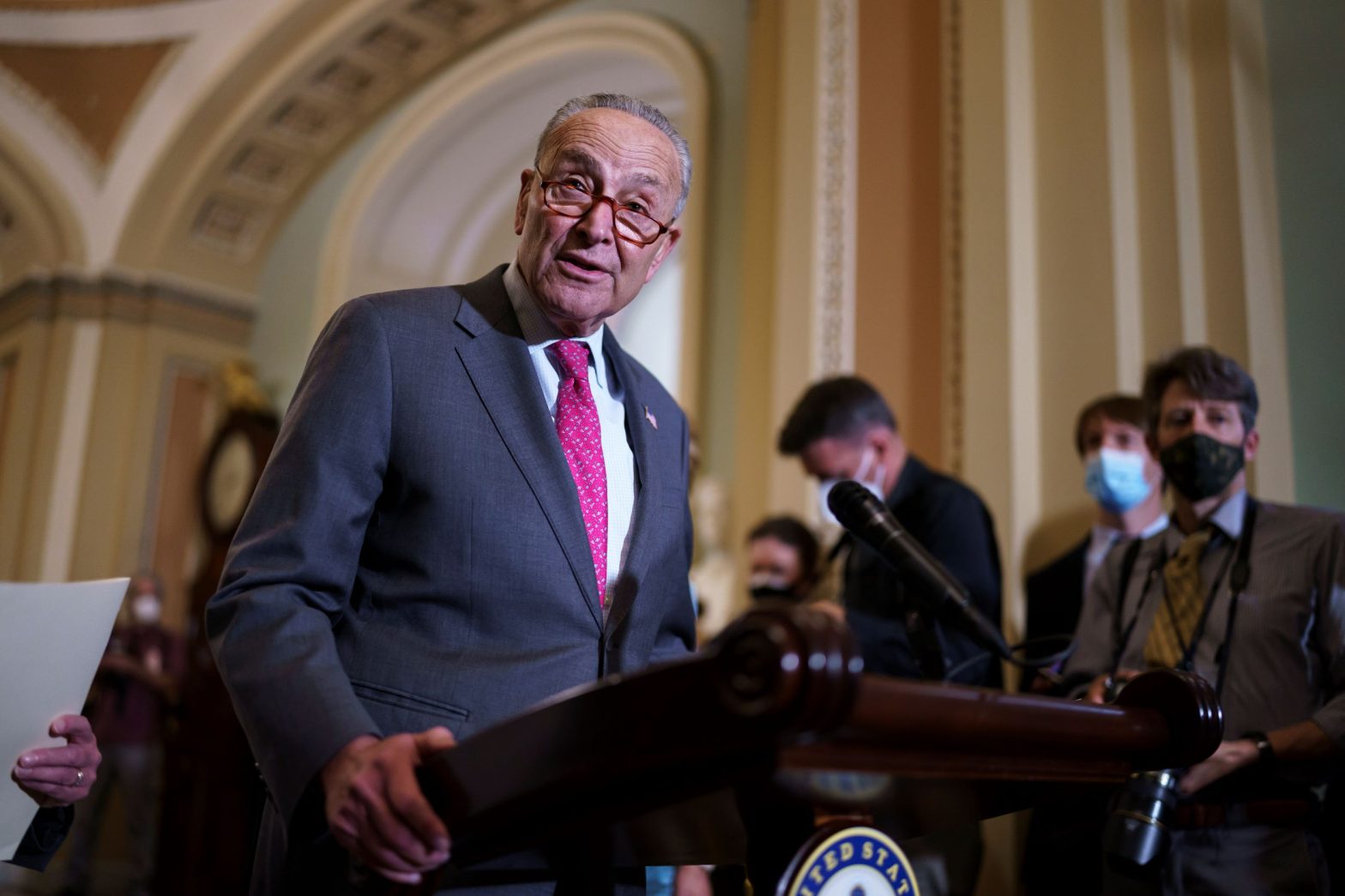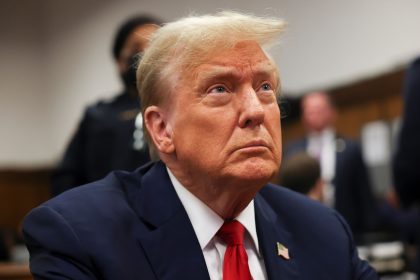Schumer Says Vote on Quashing Filibuster Could Come by Jan. 17

WASHINGTON — Senate Majority Leader Chuck Schumer said in a letter to the Senate Democratic Caucus released Monday that if Republicans continue to block sweeping voting rights legislation currently stalled in the chamber, a vote on amending or doing away with the filibuster will be held “on or before” Jan. 17.
“One year ago this week, we experienced great sorrow: mere hours after the dawn of a new Congress and a new majority, our beloved Capitol was attacked,” Schumer wrote.
“It was attacked in a naked attempt to derail our Republic’s most sacred tradition: the peaceful transfer of power. Domestic violent extremists sought to inflict chaos and violence. Fueled by conspiracy and the ravings of a vengeful former president, they sought to destroy our Republic,” he continued.
“Our democracy held — for now. As we all are witnessing, the attacks on our democracy have not ceased. In fact, they have only accelerated,” Schumer said.
“Much like the violent insurrectionists who stormed the U.S. Capitol nearly one year ago, Republican officials in states across the country have seized on the former president’s big lie about widespread voter fraud to enact anti-democratic legislation and seize control of typically non-partisan election administration functions.
“While these actions all proceed under the guise of so-called ‘election integrity,’ the true aim couldn’t be more clear,” he added. “They want to unwind the progress of our Union, restrict access to the ballot, silence the voices of millions of voters, and undermine free and fair elections.”
Later in the letter, Schumer vows Senate Democrats “will make clear that what happened on Jan. 6 and the one-sided, partisan actions being taken by Republican-led state legislatures across the country are directly linked, and we can and must take strong action to stop this anti-democratic march.”
Republicans in the Senate have used the 60-vote filibuster rule to repeatedly block voting and election bills forwarded to the floor for consideration, arguing that states should be free to run their elections as they see fit, and that to take steps to prevent that would merely be a power grab intended to federalize elections.
“Sadly … our Republican colleagues … seem wholly uninterested in taking any meaningful steps to stem the rising tide of antidemocratic sentiment still being stoked by the former president,” Schumer wrote. “In June, August, October, and once more in November, Republicans weaponized arcane Senate rules to prevent even a simple debate on how to protect our democracy.
“The Senate was designed to protect the political rights of the minority in the chamber, through the promise of debate and the opportunity to amend. But over the years, those rights have been warped and contorted to obstruct and embarrass the will of the majority — something our Founders explicitly opposed,” he continued. “The constitution specified what measures demanded a supermajority — including impeachment or the ratification of treaties. But they explicitly rejected supermajority requirements for legislation, having learned firsthand of such a requirement’s defects under the Articles of Confederation. The weaponization of rules once meant to short-circuit obstruction have been hijacked to guarantee obstruction.
“We must ask ourselves: if the right to vote is the cornerstone of our democracy, then how can we in good conscience allow for a situation in which the Republican Party can debate and pass voter suppression laws at the state level with only a simple majority vote, but not allow the United States Senate to do the same?” Schumer said.
Schumer didn’t go so far as to signal what step the Democratic majority might take, and it will likely have to be creative — with no Republicans likely to support the rule change, the Democrats would need the support of every member of their 50-member caucus and they don’t appear to have that.
Sens. Joe Manchin, D-W.Va., and Kyrsten Sinema, D-Ariz., have long said they don’t support doing away with the filibuster, though both have been willing to talk to advocates for doing so.
In the meantime, a number of senators, including Tim Kaine, D-Va., Jon Tester, D-Mont., and Angus King, I-Maine, have been working on a proposal that would change the filibuster rule and possibly overcome Manchin’s and Sinema’s objections.
In December, Kaine told Politico that it was “premature” to share details of the rule changes being discussed, but he said he and the other senators were looking at “potential rule reforms” by “putting the shoe on the other foot” and asking, “If we’re in the minority, how would we feel about this?”
Among the ideas reportedly being discussed are changes to the amendment process and how the Senate debates legislation and nominations, and creating a “standing filibuster,” which would require senators to continue debating on the floor rather than needing 60 votes to end debate on a bill.
But Schumer has signaled that he might even bring a rule change up for a vote even if he knows it’s doomed, if only to fire up the party’s base ahead of the midterm elections 11 months from now.
“Let me be clear: Jan. 6 was a symptom of a broader illness — an effort to delegitimize our election process, and the Senate must advance systemic democracy reforms to repair our republic or else the events of that day will not be an aberration — they will be the new norm,” Schumer wrote to his colleagues.
“Given the urgency of the situation and imminence of the votes, we as Senate Democrats must urge the public in a variety of different ways to impress upon their Senators the importance of acting and reforming the Senate rules, if that becomes a prerequisite for action to save our democracy,” he said.
“We must adapt. The Senate must evolve, like it has many times before,” Schumer continued. “The Senate was designed to evolve and has evolved many times in our history. As former Sen. Robert Byrd famously said, Senate Rules ‘must be changed to reflect changed circumstances.’ Put more plainly by Senator Byrd, ‘Congress is not obliged to be bound by the dead hand of the past.’
“The fight for the ballot is as old as the Republic. Over the coming weeks, the Senate will once again consider how to perfect this union and confront the historic challenges facing our democracy. We hope our Republican colleagues change course and work with us. But if they do not, the Senate will debate and consider changes to Senate rules on or before Jan. 17, Martin Luther King Jr. Day, to protect the foundation of our democracy: free and fair elections,” he concluded.























